In order to successfully respond to the challenges of the changing role of research institutions in the open innovation era, “The Innovative Food Product Development Cycle” was defined as the frame for stepping up scientific excellence of FINS throughout the cooperation with the partners across different disciplines of food technology that are integrally applied in the conversion of raw materials to innovative food products.
The main idea of the FOODstars project is to strengthen the research potential and innovation capacity of Institute for Food Technology in Novi Sad, Serbia (FINS) in close collaboration with internationally-leading research institutions, Agriculture and Food Development Authority of Ireland (TEAGASC) and University of Bologna, Italy (UNIBO). Gained efficient and high quality knowledge will be transferable to industry to gain maximum benefit from activities within Serbia, the Western Balkans and the European Research Area. By significantly strengthening research capacities, FINS will be able to transfer fundamental and applied knowledge into food technology, and hence tackle economic and social development.
The specific challenge of FOODstars is to overcome the existing gaps between research institutions, industry and SMEs and consumers throughout trainings, summer schools, workshops and different outreach activities. “The Innovative Food Product Development Cycle” will bring together researchers, industry professionals, general public including consumers, schoolchildren and students in dissemination activities such as Open Days, Round Tables and Info Evenings.
The ultimate aim of the FOODstars dissemination activities will be to interactively provide and to create the new knowledge to and with all involved partners, but especially to and with food SMEs, which ultimately will stimulate joint innovation projects and guarantee a successful and synergic cooperation in the future.

Email: aleksandra.misan@fins.uns.ac.rs
Tel: +381 21 485 3829
Impact on General Public
FOODstars is an initiator of social changes that strengthen the ability to adapt to new technologies and continued innovation. Since highly promote innovation, new skills and technological advances, FOODstars acts as a driver of industry revitalization and economic development, especially due to the fact that it targets schoolchildren and students presenting them with the effective training and career development activities in the food science and technology.
Impact on Consumers
FOODstars tends to strengthen the ties with consumers as the most available innovation partners and actively involve them in the innovation process within the food industry. By interacting with informed consumers, the food industry is able to respond to the specific consumer needs and facilitate development and delivery of the demanded new food products.
Impact on Food Industry
FOODstars brings together various skills and experiences from different fields of science, engineering and marketing which improve the innovation process in the industry and enable better technology and/or product solutions. It aims at ensuring the necessary confidence and trust between research and industry and creating long-lasting science–industry cooperation at any step in the innovation process.
Impact on Researchers
The involvement of researchers from various fields of food technology synergistically acts to promote the multidisciplinary research and enable better integration of different research, industry and consumer teams in the process of food product development. The constellation of FOODstars increases contacts, broadens networks, facilitates the discussion between partners and develops durable partnerships.
Stepping up scientific excellence of FINS throughout trainings, schools and workshops in close collaboration with project partners.
Implementation of fundamental and applied knowledge across various disciplines of food technology to respond to consumer demands for healthier food; develop new food concepts, processing technologies and food products; and improve the existing ones.
Enhancement of international cooperation with internationally recognized institutions in Europe; training and encouragement of young researchers to develop their career in research; and promotion of opportunities for further career development.
Cooperation with food industry to facilitate new product development.
Rising of awareness of innovation and knowledge transfer to industry and promotion of an entrepreneurial culture amongst food scientists and technologists.
Engagement with policymakers and consumers to ensure that knowledge and awareness about food is increased.

Institute for Food Technology (FINS) is one of the leading institutions in food and feed research and dissemination of knowledge in Serbia and the Balkan region. FINS have about 100 employees and 59 researchers. Institute is equipped with modern laboratories and pilot plants which is a guarantee of high quality results and safe products. There are pilot plants for plant based products (bakery pilot plant, confectionery pilot plant, fruit and vegetable pilot and pilot plant for sugar beet) as well as pilot plant for feed technology. FINS laboratories conduct analysis of food and feed using sensory, physical and rheological, chemical and microbiological methods using sophisticated laboratory equipment, e.g. AAS; LC-triple quadrupole MS; LC equipped with DAD, FLD and ELSD; GC-MS; GC-FID, ECD; protein bioanalyser on chip; modular advanced rheometric system (shear, dynamic, oscillatory and extensional rheology); amino acid analyser; thus bringing it to the level of the best equipped laboratories in the region. FINS has also a sound experience in providing different services to the food and feed industry in the region, including development of methods, products and processes, stuff training, consultation and support.

Teagasc is a development agency of the Department of Agriculture, Food and the Marine which exists to support science-based innovation in the Agri-food sector and the broader bio-economy. The Teagasc Food Programme is one of four programmes that form part of the research and knowledge transfer capability of the organization and is located across two research locations of approximately equivalent size. One Food Research Centre is based at Ashtown, Dublin 15 while the other centre is located at Moorepark, Fermoy in County Cork. The Food Programme covers a wide range of topics in the Agriculture/Food arena focused on research, development and innovation activities. Furthermore, the Food Programme encompasses Moorepark Technology Limited (MTL), a state-of-the-art food pilot plant, which runs as a separate company. Together with University College Cork (UCC) Teagasc have formed the UCC/Teagasc Strategic Alliance in Food Research, which brings an already vibrant interaction to a new and higher level of integration with joint strategic planning for food research, a joint approach to supporting key stakeholders, the co-development and sharing of technology platforms and a common approach to securing funding for the joint Food Research Programme. The Teagasc Research Programme spans the entire agri-food chain from farm production to food processing and innovation. The Food Programme embraces many aspects of food science and technology, and is supported by an elaborate infrastructure at both geographical sites. Moreover, there has been considerable capital investment in buildings, facilities and equipment at Teagasc Food Research Centre (TRFC) Moorepark and TFRC Ashtown, particularly in the last decade.
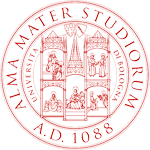
The University of Bologna, Alma Mater Studiorum (UNIBO) was founded in 1088 and is considered to be the oldest university in Western Europe. It accounts for 100,000 enrolled students, 11 schools, 33 departments, 9 research and training centres, 5 campuses, 3,000 academics and 3,000 administrative staff. At UNIBO research activities are promoted and coordinated by departments autonomously. The UNIBO personnel participating at the project belong to two Departments (Department of Agricultural Sciences and Department for Life Quality) having competences covering topics spanning from the agricultural production, management and economics to human health prevention/protection. The major research interests of the Department of Agricultural Sciences team involved in the project concern 1)plant physiology and food crop quality, with particular emphasis on the characterization of vegetable matrices in terms of bioactive compounds (mainly polyphenols and peptides) positively affecting human health; 2) agro-environmental microbiology with interests on prebiotics and probiotics for human and animal health improvement, production of bioflavours with the use of microorganisms, antimicrobial activity of natural molecules and functionalized polymers; 3) agricultural economics and rural appraisal dealing with common agricultural policy (CAP), the economics and management of water resources, the evaluation of agri-environmental policies, the rural economy in transition, farm management, agricultural and environmental decision support tools. The research team involved in the project from Department for Life Quality Studies has a strong expertise in the study of the cellular and molecular mechanisms underpinning the protective/preventive role of food components in human health. Research activities concern: evaluation of the antioxidant effect of bioactive components by in vitro analysis; evaluation of the antioxidant and cytoprotective effects of bioactive components in different cell culture types following different oxidative and inflammatory stressors.
Workshop demonstrates how food processing by-products can be used as a source of valuable bioactive compounds (dietary fibres, antioxidants, essential amino and fatty acids etc). Topics covered include bioactive isolation methods and reutilization of plant bioactives in the food industry. The workshop demonstrates how the utilization of food waste and by-products can solve emerging problems such as environmental protection and decreasing the cost of food fortification. Moreover, examples of the food waste management and utilization from the Irish food industry are presented. Workshop New value from food processing waste streams and by-products organized by the Institute of Food Technology (FINS), took place in Novi Sad in March 2016, from Monday 21 (starting time: 9:15) to Tuesday 22 (end 15:00 h).
Workshop encompasses the general framework of EU Food Law as a prerequisite for ensuring safe and quality food of the highest standard at all stages of the production and distribution chains. Particularly, the workshop addresses EU food labeling rules in terms of nutritional information, country of origin, genetically modified organisms and novel food ingredients. Moreover, the procedure and legislation on nutrition and health claims are covered.
Workshop-On the road to Innovation Union: European food legislation organized by the Institute of Food Technology (FINS) and Chamber of Commerce of Vojvodina , took place in the Chamber of Commerce of Vojvodina in Novi Sad on 5 September 2018.
Training activities include isolating, separating and characterizing plant polyphenols and peptides for food application. Outcomes include general knowledge on plant bioactives and their potential for food application, overview of conventional and novel extraction procedures, modern separation and quantification techniques. Practical lab activities include sample preparation, conventional extraction, separation by chromatographic techniques and quantification with authentic standards of phenolics and peptides from plant materials.
Two trainings Novel methods of isolation and determination of plant bioactives took place in the Department of Agricultural Sciences, University of Bologna, Bologna and were supervised by prof. Giovani Dinelli. The first training was organized from June 2nd to July 2nd 2016, for three FINS researchers: Bojana Šarić, Jelena Krulj and Ivan Milovanović. The second training was held from February 23th to March 24th 2017, for three FINS researchers: Aleksandra Mišan, Elizabet Janić-Hajnal and Jelena Tomić.
Training provides the guidance for the role of plant antimicrobial agents to fight microbial infections and emphasizes the potential antimicrobials to provide quality and safety benefits to many materials. Moreover, the training provides the guidance for the introduction of antimicrobial functional groups into polymer molecules in order to enhance the efficacy of some existing antimicrobial agents.
Training Antimicrobial activity of natural molecules and functionalized polymers took place in the Department of Agricultural Sciences, University of Bologna, Bologna and was supervised by prof. Diana Di Gioia. The training was organized from September 4th to October 4th 2016, for two FINS researchers: Aleksandra Novaković and Tanja Radusin.
The aim of the training is to acquire new knowledge in the field of application of novel processing technologies - pulsed electric field, high pressure, and ultrasound in food processing and to learn how they could be used to replace conventional food processing technologies to reduce process intensity, save energy, reduce waste and provide products with enhanced quality and nutritive value.
Two trainings Innovative technologies for advanced food processing took place in the Teagasc Food Research Centre, Ashtown, Dublin and were supervised by dr. Brijesh Tiwari, Principal Research Officer. The first training was organized from 1st to 30th April 2016. for three FINS researchers: Vojislav Banjac, Nataša Nedeljković and Jovana Kojić. The second training was held from 27th July to 27th August 2016 for: Nataša Nedeljković, Bojana Šarić and Miroslav Hadnađev, all from FINS.
The aim of the training is to develop the basic knowledge about effective delivery of nutrients, bio-active compounds and sensitive ingredients through food systems, encompassing three main research topics related to the encapsulation technologies: (1) carrier materials for encapsulation, (2) encapsulation technology and (3) properties and functionality of encapsulated systems.
Two trainings Encapsulation of food ingredients took place in the Teagasc Food Research Centre, Ashtown, Dublin and were supervised by Dr. Brijesh Tiwari, Principal Research Officer. The first training was organized from 15th February to 16th March 2017 for two FINS researchers: Miona Belović and Ivan Milovanović. The second training was held from 31st July to 27th August 2017 for two FINS researchers: Milica Pojić and Aleksandra Mišan.
Training addresses the types, settings and application of consumer tests, sampling, recruitment and screening methods, quantitative methods and qualitative tests, relating consumer and sensory data by using appropriate statistical techniques and market research methods.
Training Consumer testing methods took place in the Teagasc Food Research Centre, Ashtown, Dublin and was supervised by dr. Maeve Henchion, Research Officer. The training was organized from 1st to 30th September 2016 for two FINS researchers: Mladenka Pestorić and Dubravka Škrobot.
Training addresses the topics on the characterisation of (micro) structures related to food processing and formulation, identification and mapping of food ingredients and the techniques used for food microstructure inspection - conventional light, confocal, scanning electron and atomic force microscopy and hyper spectral imaging technique.
Two trainings Application of imaging techniques in the study of food structure took place in the Teagasc Food Research Centre, Moorepark, Fermoy and were supervised by dr. Mark Auty, Senior Research Officer. The first training was organized from 5th March to 1st April 2016 for three FINS researchers: Bojana Filipčev, Olivera Šimurina and Miona Belović. The second training was held from 31st October to 29th November 2016 for three FINS researchers: Milica Pojić, Tamara Dapčević-Hadnađev and Miroslav Hadnađev.
Training is organized to characterise odour active and characteristic impact compounds in complex mixtures responsible for the odour of a food sample not only as an instrumental, but also as a sensory analysis. Particular attention is paid to sample preparation techniques, extraction techniques GC–O, GC-MS measurement methods and multivariate statistical analysis of data sets.
Training entitled Application of gas chromatography-olfactometry in food flavour analysis took place in Teagasc Food Research Centre, Moorepark, Fermoy and was supervised by dr. Kieran Kilcawley, Principal Research Officer. Training was organized from 31st October to 29th November 2016 for three appointed trainees from FINS: Dubravka Škrobot, Pavle Jovanov and Anamarija Mandić.
The school encompasses tutorial lessons and practical laboratory classes to demonstrate and perform simple experiments of in vitro antioxidant activity of food extracts by spectrophotometric techniques and to evaluate the cytoprotective role in cell culture systems.
School Evaluation of the antioxidant and cytoprotective effect of bioactive components in different cell culture types took place in the Department for Life Quality Studies, University of Bologna, Rimini and was supervised by Prof. Silvana Hrelia. The school was organized from May 8th to May 19th 2017, for three FINS researchers: Marijana Sakač, Aleksandra Novaković and Anamarija Mandić.
General aim is to elucidate the role of probiotics and prebiotics in increasing the functional value of food products Particularly, current knowledge and techniques used in the microencapsulation of probiotic microorganisms to enhance their viability during fermentation, processing and utilization in commercial products will be analyzed, as well as evaluation of functional properties due to the addition of targeted probiotic strains.
School Probiotics for food industrial applications took place in the Department of Agricultural Studies, University of Bologna, Bologna and was supervised by Prof. Diana Di Gioia. The training was organized from July 3th to July 14th 2017, for three FINS researchers: Tamara Dapčević Hadnađev, Miroslav Hadnađev and Milica Pojić.
School is organized to demonstrate how optimization strategies can be used to achieve the maximal utilization of raw materials, consistent quality and yield and improve the overall food processing and food formulation. Mathematical based optimization techniques and procedures, their limitations and possibilities along with the review of optimization studies for different food processes involving various experimental designs including response surface methodology and chemometric techniques. School Methods of optimization for advanced food processing organized by TEAGASC, Ireland took place at the Institute of Food Technology (FINS) in Novi Sad in May 2016, from Monday 23 (starting time: 9:00) to Friday 27 (end 15:00 h). The school was led by Dr. Brijesh Tiwari and organised exclusively for FINS researchers. Referring to the feedback of attendees, it was a great success since the topics covered were chosen in line with the most contemporary data analysis in food science.
School is organised to introduce attendees to specific techniques used for the confirmation of food authenticity and detect adulteration of incoming raw materials and final products. Different techniques that will be covered by the program will include different types of spectroscopy, chromatography, immunological techniques and thermal analysis coupled with chemometric analysis.
School Food authenticity and detecting and quantifying food adulteration took place in TEAGASC, Food Research Centre, Ashtown, Ireland and was supervised by Dr. Martin Danaher. The training was organized from October 2nd to October 13th 2017, for three FINS researchers: Jovana Kos, Pavle Jovanov and Anamarija Mandić.
Survey for consumers could be found at this link. It is available in Serbian language only, since the outreach activity is planned for Serbian consumers.
Information evenings are organized for interested consumers as panel discussions on hot issues that affect the food we eat. The topics that are covered were generated on the basis of consumers’ survey.
The first information evening organized by the Institute of Food Technology (FINS) for consumers took place in Novi Sad in Startit Community Bar on Thursday, 7 December 2017, from 18:00 to 20:00 h. The topic of this informational evening was dedicated to food additives, according to the results of the performed consumers’ survey. FINS experts gave the overview presentation on additives in food products, followed by panel discussion and the questions from the audience. Panelists were: Dragana Kovač, BSc in food technology, quality control and quality assurance manager from retail chain Gomex, Nikolina Mandić, BSc in food technology, Manager of laboratory in PIP, Novi Sad and Jasna Mastilović, PhD in food technology, principal research fellow from FINS. Final session of the evening was degustation of the food products prepared with and without food additives.
The second information evening for consumers took place in FINS on Tuesday, 20 February 2018, from 17:00 to 19:00 h. The topic of this informational evening was dedicated to fats in food, according to the results of the performed consumers’ survey. Panel discussion and the questions from the audience were broadcasted in a TV show at Radio-televizija Vojvodine ’’Potrošački reporter’’ . Panellists were: Jelena Milešević, Nutritionist, Institute for Medicinal Research, University of Belgrade, Aleksandra Mišan, PhD in chemistry, principal research fellow and Tatjana Peulić, PhD in food technology, research fellow from FINS.
The third information evening for consumers took place in Novi Sad in Startit Community Bar on 14 March 2018, from 17:00 to 19:00 h. The topic of this informational evening was dedicated to salt in food. Panelists gave the overview presentations on technological aspect of salt in food products and surveys on salt consumption of salt, followed by panel discussion and the questions from the audience. Panellists were: dr Milka Popović, Institute for Public Health of Vojvodina, Novi Sad and Jasna Mastilović, PhD in food technology, principal research fellow from FINS. Final session of the evening was sensory evaluation of the bread prepared with different content and types of salt.
school children to explore the fun of food research,
under- and postgraduate researchers to enable them to review the possibilities for further research and postgraduate research opportunities
industry representatives and other business stakeholders to demonstrate the existing research capabilities and to find opportunities of joint cooperation and partnership.
Open day for children organized by the Institute of Food Technology (FINS), took place at the Science Festival in Novi Sad on 13-14 May 2017, from 9:00 to 19:00 h. Open days are organized for several target groups: school children to explore the fun of food research, under- and postgraduate researchers to enable them to review the possibilities for further research and postgraduate research opportunities, industry representatives and other business stakeholders to demonstrate the existing research capabilities and to find opportunities of joint cooperation and partnership.
Open day for high-school students organized by the Institute of Food Technology (FINS), took place in Novi Sad on Friday, 17 May 2017, from 11:00 to 13:00 h. Open days are organized for several target groups: school children to explore the fun of food research, under- and postgraduate researchers to enable them to review the possibilities for further research and postgraduate research opportunities, industry representatives and other business stakeholders to demonstrate the existing research capabilities and to find opportunities of joint cooperation and partnership.
Open day for industry partners entitled Sensory Evaluation in Food Quality Control organized by the Institute of Food Technology (FINS), took place at FINS on 23 November 2017, from 9:00 to 18:00 h.
Survey for SMEs could be found at this link. It is available in Serbian language only, since the round table is planned for Serbian food industry and SMEs.
Round table discussions address scientific community and SMEs representatives. The aim of the roundtable is to highlight the current problems SMEs are facing to achieve their competiveness in a knowledge-based economy and to suggest the ways of overcoming them. The significance of intellectual property, products innovation, marketing channels, market and services, but also the improvement of the research and development ability is addressed.
The first round table Current problems in food SMEs in Serbia– and the ways of overcoming them organized by the Institute of Food Technology (FINS), took place in Novi Sad on Wednesday, 17 May 2017, from 11:00 to 13:00 h.
The second round table discussion ’’Innovation in food sector and the possibilities of their commercialisation: Models of financial support for small and medium enterprises’’ organized by the Institute of Food Technology (FINS), took place in Novi Sad on 25 April 2018, from 11:00 to 13:00 h.
FoodTech 2018 international congress encopassing 4th International Congress “Food Quality, Technology and Safety” and 18th International Symposium “Feed Technology” took place in Novi Sad, Serbia on 23-25 October, 2018 as the final FOODstars event.
The event gathered the representatives of universities and research institutes, but also food producers, nutritionists and distributors, with a common aim to promote research, development, innovation and education within food science and technology. The FoodTech Congress was organized in several sessions through which the FOODstars project and its achievements were promoted. The scientists from partner institutions were appointed as members of the Congress’s Scientific Committee and were actively involved the realization of Congress program through:
Plenary and keynote lectures
Dr Brijesh K. Tiwari from Teagasc Food Research Centre, Ireland, gave a lecture on role of novel technologies for ensuring resilient food production systems.
Prof. Dr Giovanni Dinelli from the University of Bologna, Italy, gave a lecture on traditional food: functional properties and perspectives
Dr Milica Pojić from the Institute of Food Technology (FINS), University of Novi Sad, Serbia gave a lecture on innovative food product development cycle
Prof. Dr Young Hae Choi from the Leiden University, The Netherlands, gave a lecture on metabolomics in food assessment in holistic manner
Round table
“Overcoming the gap between industry and academia: towards open innovation practices in food and feed sector”, Participants: Dr Ivan Štefanić, Faculty of Agrobiotechnical sciences of Osijek, Croatia , Dr. Miriam Walsh, Teagasc technology transfer office (Ireland), Dr Zisis Tsiropoulos Centre for Research & Technology Hellas (Greece), Dr Mladen Radišić, Faculty of Technical Sciences, University of Novi Sad, Serbia
More information about the event: http://foodtech.uns.ac.rs/
Workshop focuses on the molecular and cellular mechanisms behind discoveries of the cardioprotective, neuroprotective and chemopreventive effect of polyphenols and bioactive peptides from food sources. Round table and group discussions are favoured on the possibility to translate in vitro studies to nutritional recommendations to general population or specific cohorts of subjects at risk of disease.
Workshop Protective/preventive role of bioactive food components in human health, jointly organized by the Institute of Food Technology and University of Bologna, Department for Life Quality Studies, Italy and led by prof. Silvana Hrelia took place at the Institute of Food Technology (FINS) in Novi Sad in December 2016, from Thursday 13 (starting time: 9:00) to Wednesday 14 (end 15:00 h). The workshop gathered research staff of FINS and wider academic community from different fields: food science and technology, chemical, medical and biological sciences and health protection. The presentations were given by prof. Silvana Hrelia, prof. Marco Malaguti and prof. Cristina Angeloni. Workshop addressed the basic molecular and cellular mechanisms responsible for efficient cardio- and neuroprotection, as well as chemoprevention induced by wide range of nutraceuticals.
Workshop Green extraction techniques in food science organized by the Institute of Food Technology (FINS), took place in Novi Sad in March 2017, from Monday 27 (starting time: 9:15) to Wednesday 29 (end 13:00 h).
Workshop addresses the special advantage of using natural ionic liquids (ILs) and deep eutectic solvents (DES) – NADES technology - for food applications, especially for the extraction and recovery of natural products. Moreover, the workshop addresses the composition, extraction properties, solubility and sustainability of NADES. NADES technology is an exclusive invention of a research group from the University of Leiden, Natural Products Laboratory, Institute of Biology, The Netherlands.
Workshop addresses the application of novel technologies for microencapsulation and industrial scale up challenges, as well as various extrinsic and intrinsic factors affecting techno-functional and nutritional properties of encapsulated particles and matrices.
Workshop Recent developments in microencapsulation of food ingredients organized by TEAGASC, Ireland and led by by Dr. Brijesh Tiwari took place at the Institute of Food Technology (FINS) in Novi Sad in October 2016, from Thursday 6 (starting time: 9:00) to Friday 7 (end 16:00 h). The workshop gathered research staff of FINS and wider academic community. The presentations were given by Dr. Brijesh Tiwari, Dr. Carlos Álvarez, Dr. Camila Perussello and Dr. Ciara McDonnell. Referring to the feedback of attendees, the workshop was a great success since it addressed the basic topics in the field of encapsulation and also offered great opportunities for the networking.
Workshop provides the guidance for researchers through the essential sections of a business plan. In addition, it provides an overview of the steps needed to build a business plan and how to make sure the business plan is realistic and convincing. Finally, it discusses basic notions related to the calculation of economic profitability indicators and how to present uncertainty in market information and economic results.
Workshop Creation of a successful business plan organized by the Institute of Food Technology (FINS), took place in Novi Sad in May 2017, from Monday 22 (starting time: 9:15) to Tuesday 23 (end 16:00 h).
Workshop addresses the importance of intellectual property and the management of intellectual property. Different forms of intellectual property are reviewed and the tips for identification of transferable R&D results will be given.
Workshop IPR in food science organized by the Institute of Food Technology (FINS), took place in Novi Sad in December 2017, from Monday 11 (starting time: 9:00) to Tuesday 12 (end 16:00 h).
Workshop gives the introduction to knowledge transfer, how to manage knowledge and technology transfer, how to explore and identify industry needs, how to establish a dialogue between the industry and research and which knowledge and technology transfer tools to employ.
Workshop Knowledge transfer to food SMEs organized by the Institute of Food Technology (FINS), took place during the 85th International Agricultural Fair in Novi Sad on 16 May 2017.
Workshop tends to give up-to-date information and technical knowledge of each step of the food product development process – from ideas generation to shelf-life trials and consumer research to legislation issues; scaling up the product from the laboratory and pilot plant to commercial production and product cost calculations.
Workshop-From idea to innovative food product organized by the Institute of Food Technology (FINS) took place in Novi Sad on 26 Jun 2018. The workshop was realized by Prof. Dr Petar Vrgovic, associate professor of the Faculty of Engineering, Novi Sad, and scientific advisers of FINS, Dr Jasna Mastilovic, Dr Mladenka Pestorić, Dr Aleksandra Mišan, Dr Anamarija Mandic and Dr Milica Pojić. Relying on the principles of open innovations, the workshop was organized with the aim of testing a new concept of cooperation between consumers, scientists and industry, as a means of improving food, food technologies and products on the market. Representatives from science, industry and consumers were given an opportunity to express their attitudes towards the idea of utilization of food industry by-products – “reincarnation as an innovation”. The food industry is aware that it generates by-products, which are currently largely classified as waste; consumers have not been interested in the use of secondary products, but this idea sounds interesting to them as they understand what is offered and why, and while it is safe for health, and scientists think that the utilization of by-products of the food industry is an actual and socially responsible topic for research. However, the ultimate result of dealing with this topic is often a product that is ready for use, but which is not commercialized and exists only in a scientific context. It the last session of workshop, it was demonstrated that when properly guided and given the opportunity to work in interdisciplinary groups, consumers, industry and science are capable of providing innovative solutions.
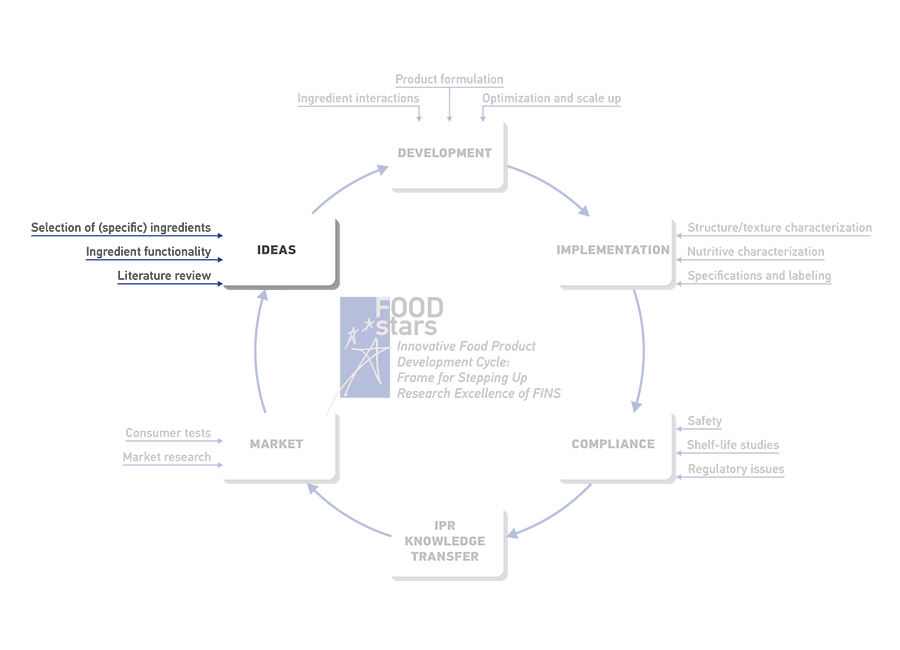
The objectives of WP1 is to gather the new and deepen the existing knowledge on the isolation, determination and function of food components from traditional food raw materials and from food processing waste streams and by-products with potential health benefits that can be used in the formulation of innovative food products.
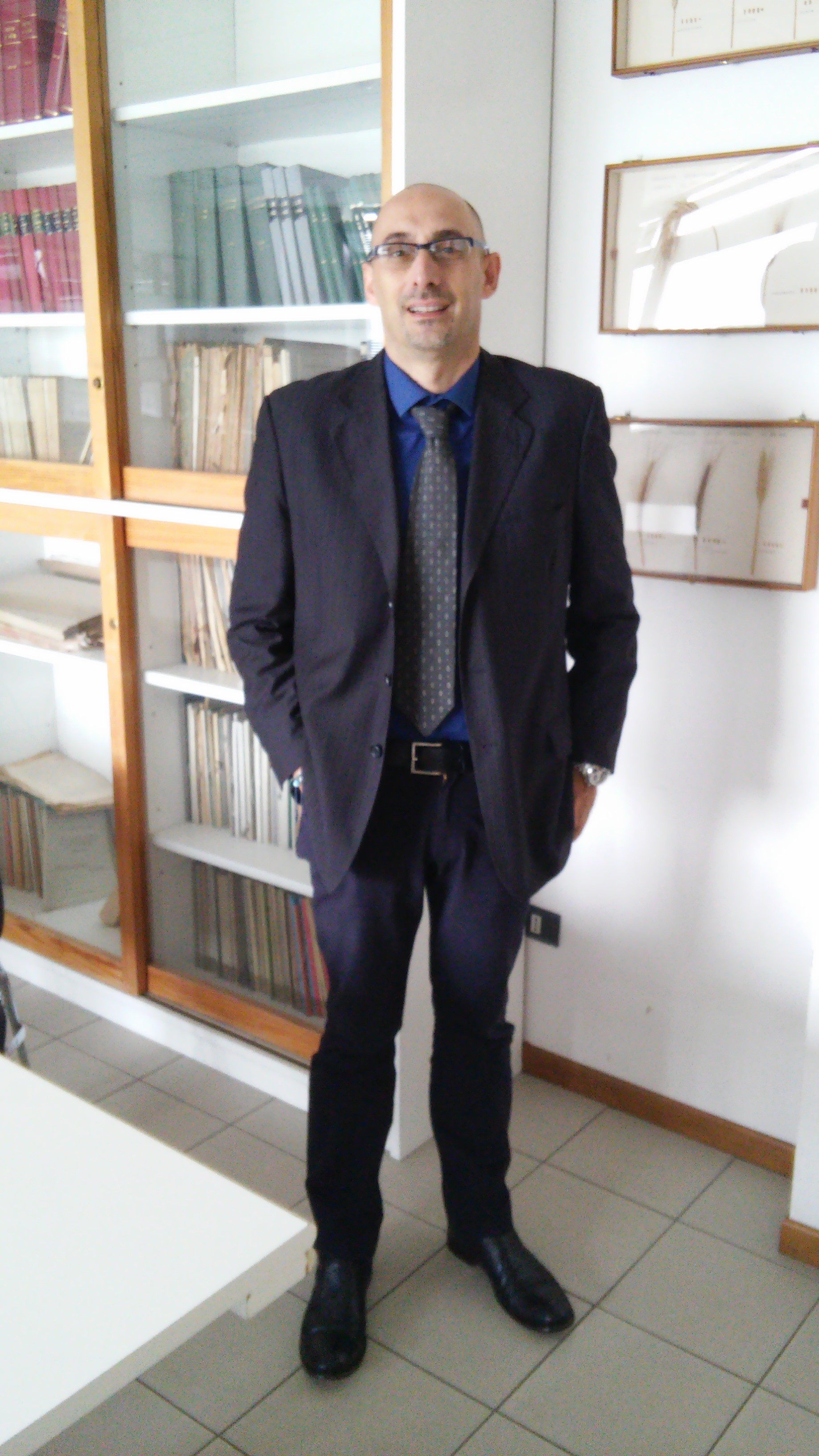
Prof. Giovanni Dinelli is a full Professor at the Department of Agricultural Sciences, University of Bologna, Italy. He is a coordinator of a research group studing nutraceutical compounds produced by various minor and major crops, with the aim to improve the knowledge on the role of primary production in the sector of functional foods.
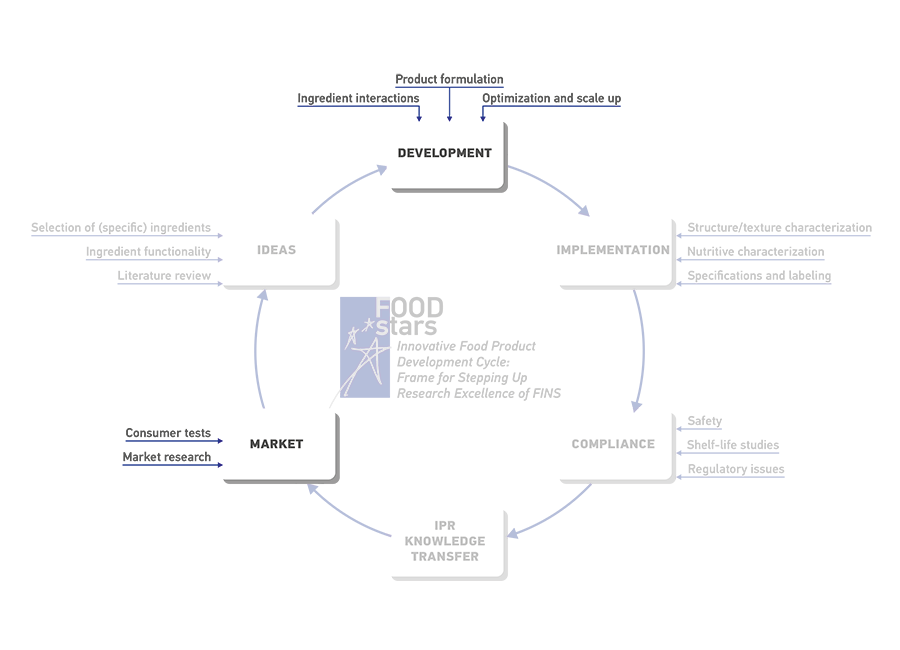
The objectives of WP2 is to gather the new and deepen the existing knowledge in all important steps of product design and process development using both conventional and novel technologies such as pulsed electric fields, ultrasound and high pressure including optimization and processing scale-up. Moreover, the role of consumers and the mechanisms of their involvement in the development of food products will be elaborated.
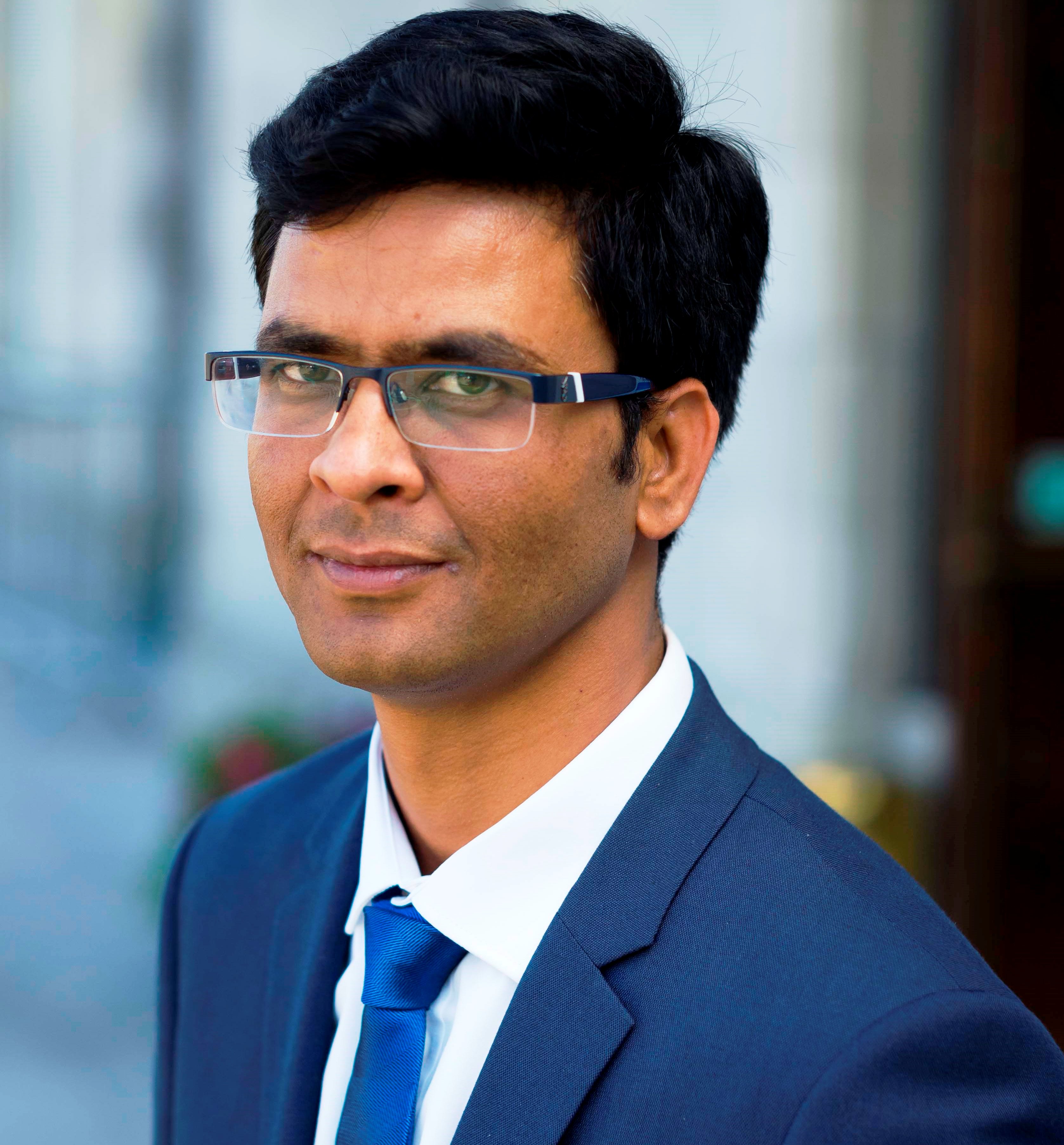
Brijesh Tiwari, PhD is a Senior Research Officer at Teagasc Food Research Centre, Ireland. Dr. Tiwari’s gained international recognition in the research areas of non-thermal processing technologies. His current research relates to the investigation of green and sustainable technological solutions to food industry challenges in the area of food extraction and preservation.
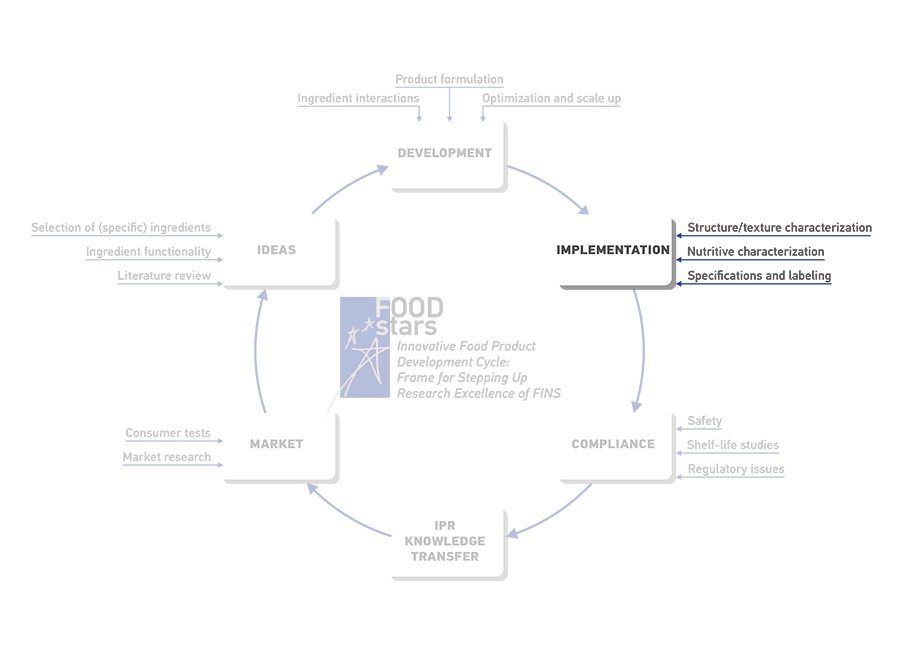
The objective of WP3 is to acquire the essential knowledge how to use novel instrumental techniques to manage food structure and flavour as well as to detect food adulteration and determine food authenticity to provide value to the food industry and modern consumers’ demands.
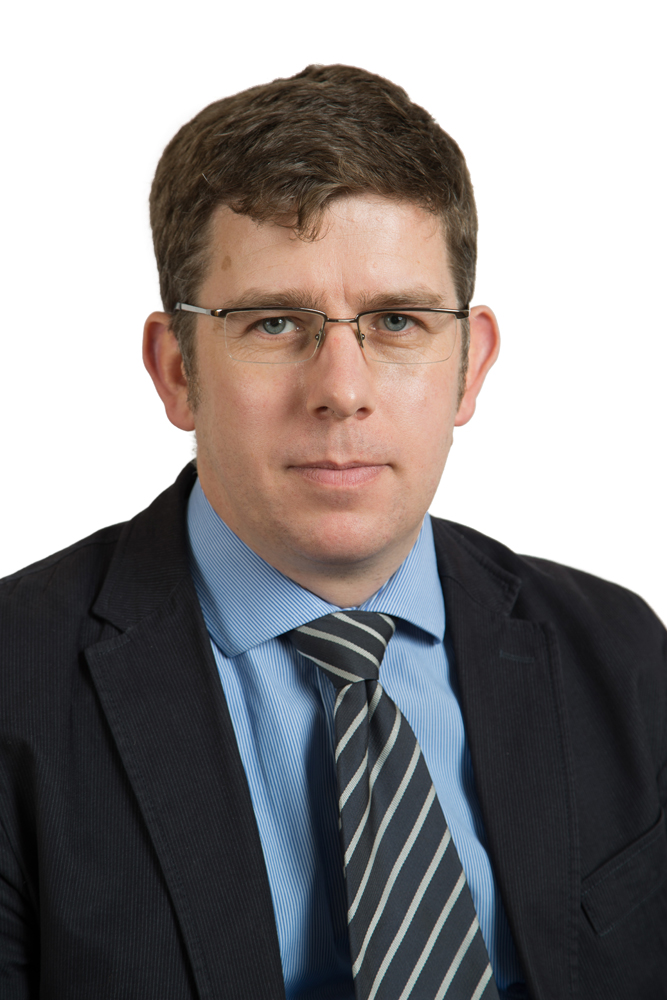
Martin Danaher, PhD is a Senior Research Officer at Teagasc Food Research Centre, Ireland. He is a head of the Irish National Reference Laboratory for veterinary drug, feed additive and pesticide analysis in food. Dr. Danaher’s research focus is on the development of analytical methods in biological matrices and water, with a strong focus on validation.
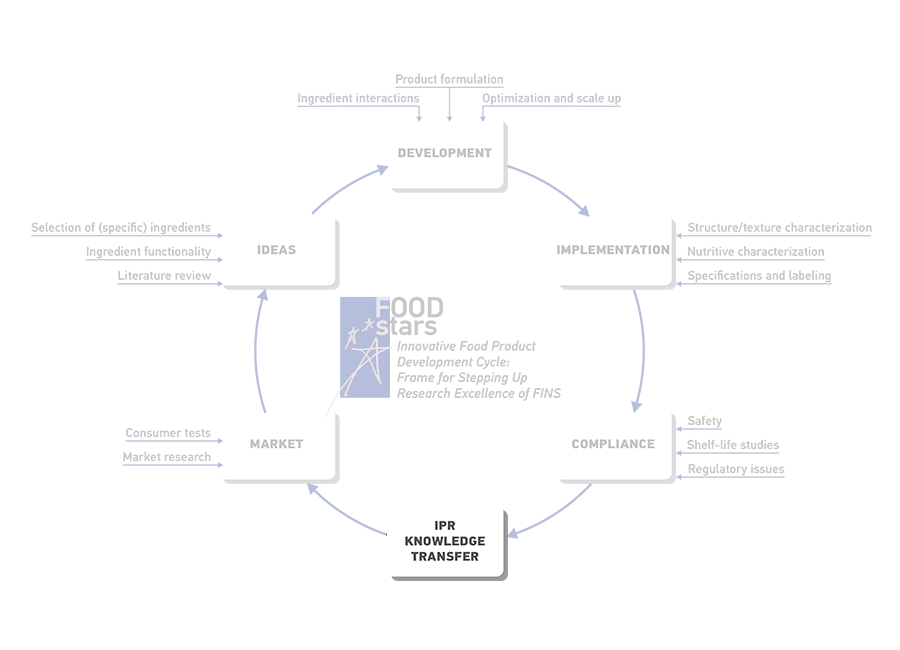
The objective of WP4 is to promote and raise the consciousness of the knowledge and technology transfer and innovation from FINS to food industry. Throughout WP4 FINS researchers will be provided with knowledge and skills required for knowledge management, organization and distribution of knowledge to industry stakeholders.

Declan Troy, PhD is an Assistant Director of Research, Director of the Technology Transfer Office, Teagasc, Ireland. He coordinated numerous EU food science projects and has collaborated in his research programme with many different research groups from all around the world including Australia, Korea and USA. Dr. Troy contributed to the introduction of new technologies at industrial level particularly in Irelands competitive beef sector.
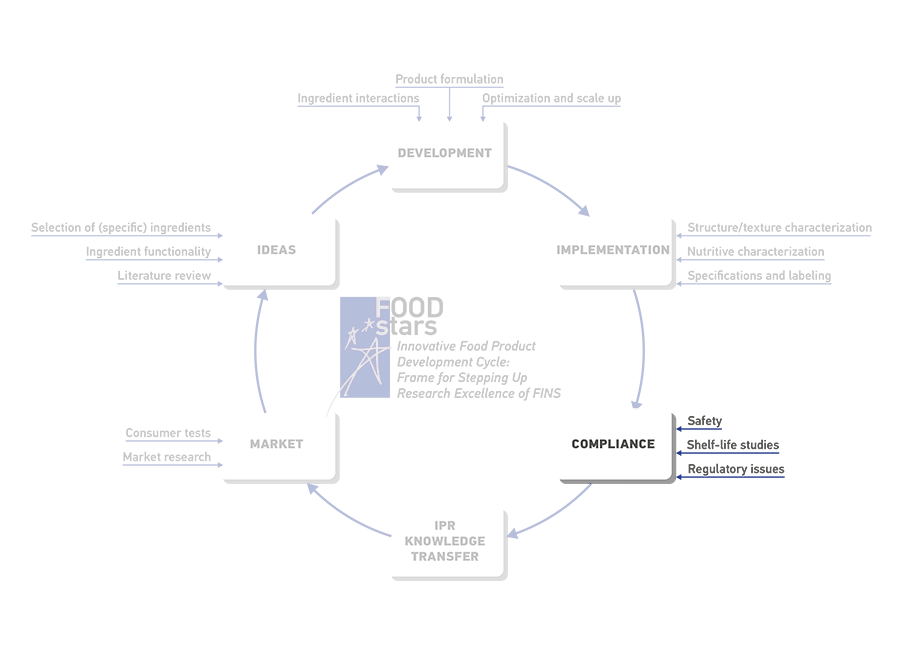
The objective of this work package is to introduce, disseminate and promote the activities of the project and knowledge acquired during the project to interested business parties and general public in order to initiate the strategic changes and rapid innovations in food industry and to bridge the gap between research on one and industry and consumers on the other side.
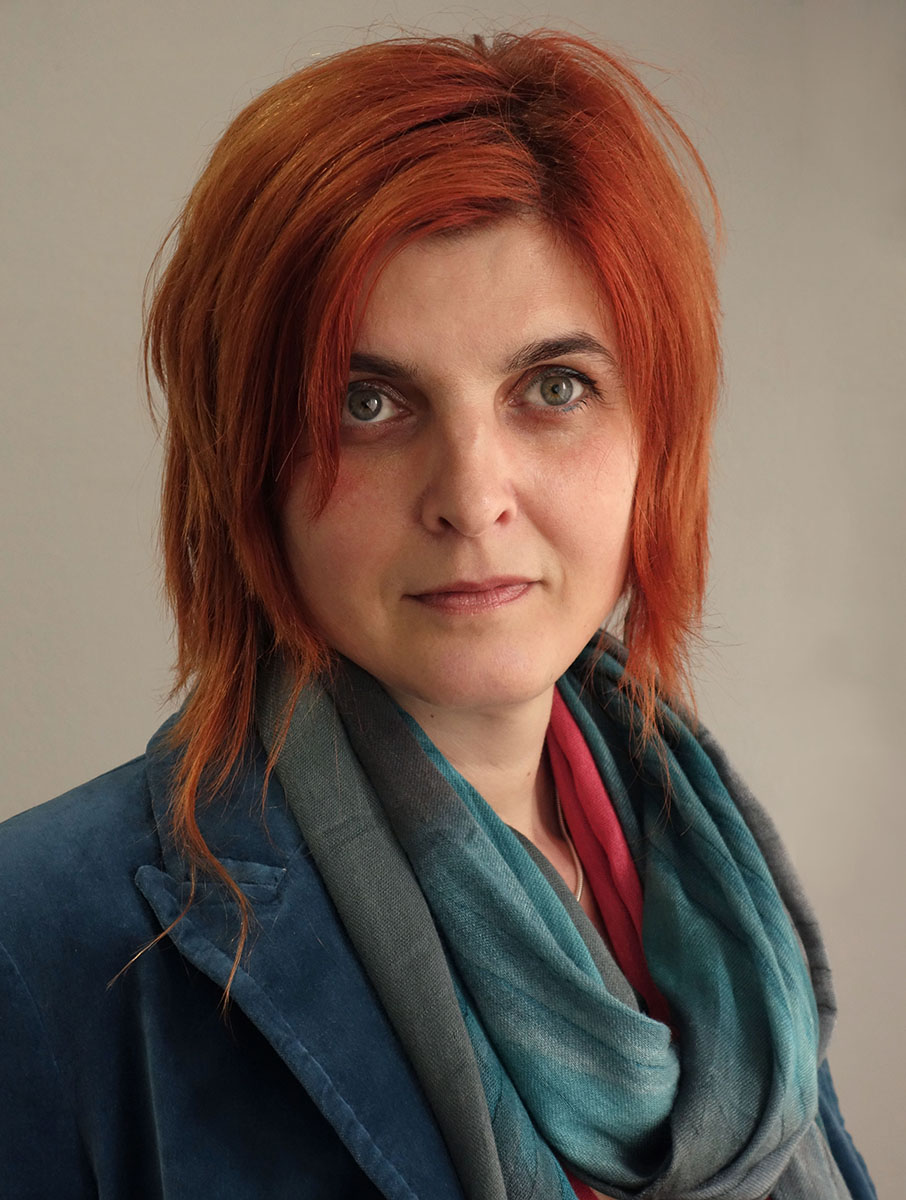
Anamarija Mandic, PhD is a Principal Research Fellow and Head of the Research Unit for Quality, Functionality and Safety of Food at the Institute of Food Technology, Serbia. She coordinated numerous national food science projects and have been actively involved in the realization of EU funded projects. Dr. Mandic’s research interesets are in the field of natural antioxidants, formulation and design of tailor made foods. She has over ten years’ experience in chromatographic techniques used for elucidation of small molecules present in food.

The objectives of WP6 are to coordinate and supervise activities according to the work plan, to carry out the overall administrative and financial management of the project, to manage contacts with the EU Commission, to manage the new knowledge generated by the project, to manage and implement the EU grant agreement and the consortium agreement, to monitor the quality and timing of project results, to solve possible conflicts, and to establish the effective internal and external communication procedures.
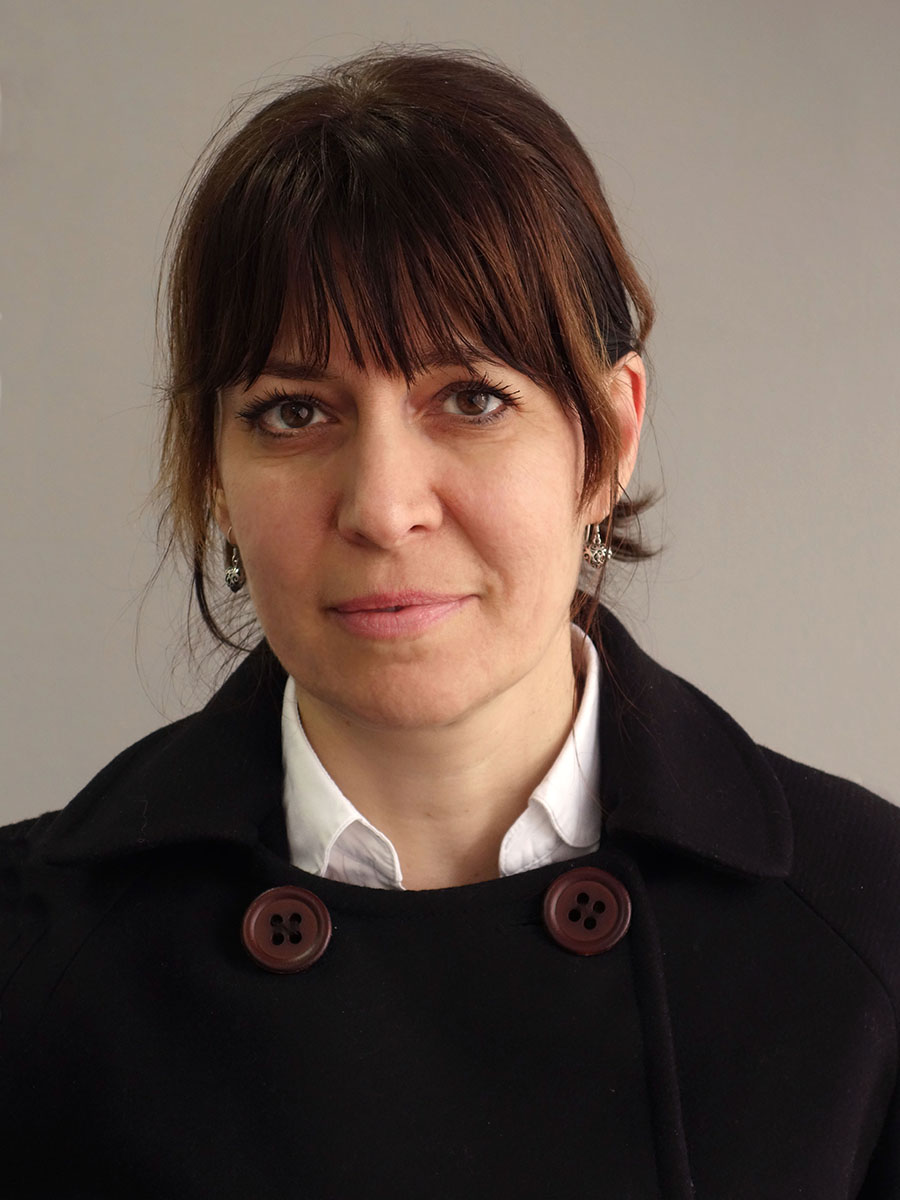
Milica Pojic, PhD is a Research Associate and Head of the Research Center for Technology of Plant Based food products at the Institute of Food Technology, Serbia. Dr. Pojić’s research interests are in the field of cereal quality and processing and the development of cereal-based products based on the principles of experimental design and their characterization especially in terms of rheological and structural properties.

